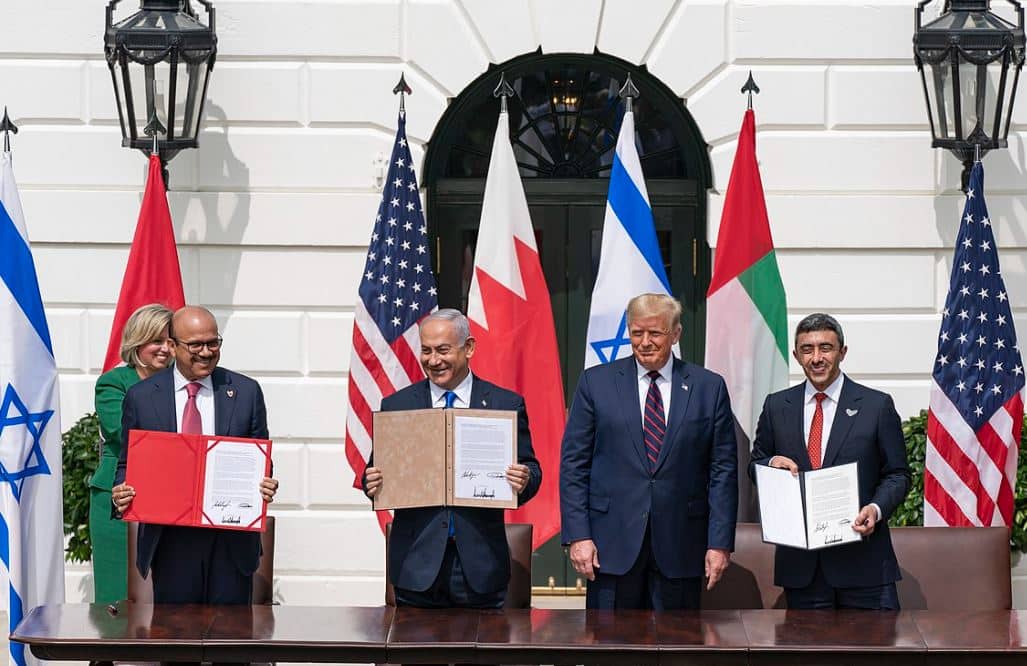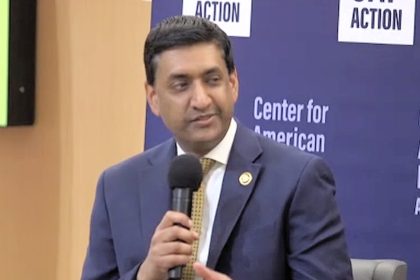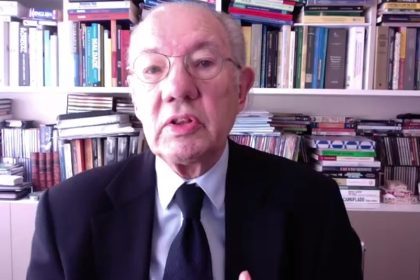Ambassadors Stand With Palestine While Celebrating First Year of Abraham Accords

WASHINGTON — One year ago the United States, UAE, and Bahrain signed a historic agreement and charted a new course in Arab-Israeli relations which recognized the state of Israel and normalized diplomatic relations between the countries. But the desire for a two-state solution recognizing both Israel and Palestine remains strong.
On the anniversary of the Abraham Accords, ambassadors of the UAE and Bahrain joined James Jeffrey, former ambassador to Iraq and Turkey and chair of the Wilson Center’s Middle East Program to share their perspectives on the progress of the agreement with the independent research center.
The Abraham Accords are “probably the biggest breakthrough between Arabs and Jews in the last 25 years,” admitted Abdulla Bin Rashid Al Khalifa, ambassador of Bahrain to the U.S. “[They] bring us closer to comprehensive peace in the region.”
“Together, we chose peace, progress, and prosperity, over our past differences. We choose to work together to change the way Jews and Arabs perceive each other, to promote mutually beneficial economic activity, and to face the larger challenges in the Middle East, as a united front,” Gilad Erdan, Israel’s ambassador to the U.S. and the United Nations, added via video address.
However, he admitted that there was much to test after the Accords were signed a year ago.
“I’m glad to say that one year later these agreements have gone well beyond [declarations],” Erdan added.
A successful first year of the Abraham Accords has built the foundation for a new era in the Middle East, and, according to Erdan, “learning how much the sons of Abraham truly have in common.”
In fact, in addition to Sudan and Morocco signing onto the Accords, bringing total signatories to six, the past year has seen a flourishing of bilateral initiatives in business, tourism, and trade.
Not only are more agreements than ever under discussion or underway, but travelers can now fly direct from Israel to Marrakech or Abu Dhabi, Israelis and Emiratis can visit each others’ country without a visa, Israeli children are being born in Dubai, Emiratis are choosing to study in Israel, and embassies for both the UAE and Bahrain opened in Israel last month.
“Things exceeded my expectations… This is a very big net positive for data, trade, jobs, investment, and people to people interactions,” said Yousef Al Otaiba, ambassador of the United Arab Emirates to the U.S., suggesting that the agreement’s geopolitical and economic benefits could have spillover effects across the region and possibly the world. “Every indicator shows we’re just skimming the surface.”
But while some metrics are easier to tout, Al Otaiba suggested that it is actually the intangibles and immeasurables that may have the most significance.
“It’s hard to explain how people’s mindsets have shifted,” he said. “The thing that has changed the most is people’s understanding.
“You grow up programmed a certain way, but my son is not going to grow up that way… We can have disagreements; it doesn’t mean we hate each other.”
Khalifa agreed that the Accords created a new medium for dialogue and understanding.
“As we move forward, the most important issue is going to be trust,” he said. “I think that there needs to be a continuous commitment from the United States, to acknowledge the Accords, and to move forward— no matter who’s in office. This is a once-in-a-lifetime deal and I think a lot has been achieved in one year. A lot can be achieved in the years to come.”
Among the achievements could be the advancement of a two-state solution in the region, as the ambassadors, committed to a viable and independent Palestinian state, believe the Accords may have opened necessary channels of communication between the Arab states of the Gulf and Israel.
“The two-state solution is the only game in town,” Al Otaiba stressed. “But if the Abraham Accords had not happened, we would not be talking about a two-state solution. I am being very blunt: I think we salvaged the two-state solution.”























